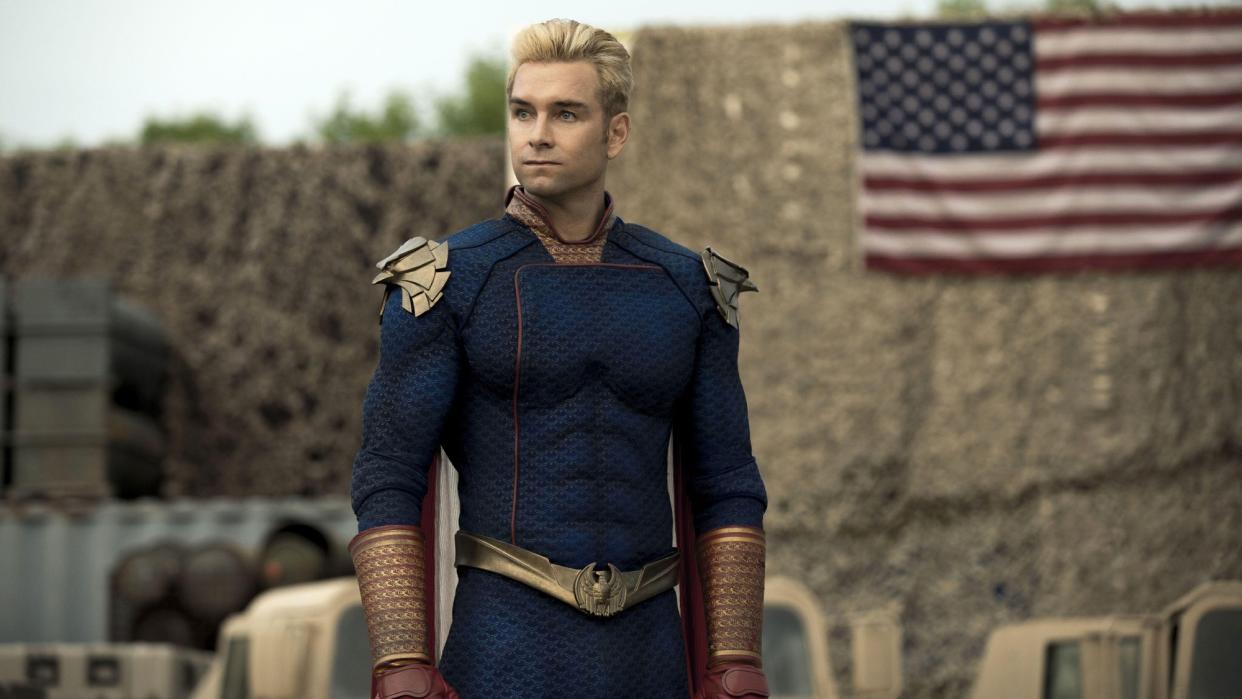The only TV show you need to watch this election year

The fourth season of Amazon Prime's superhero satire "The Boys" debuted in June, and it might just be the United States' most politically relevant show of this election season. When the series debuted in 2019, "The Boys" instantly upended the superhero canon.
Cartoonishly ultraviolent, the show features sociopathic superheroes gleefully committing blood-soaked crimes against anything that moves. It's the kind of show for which the industry's TV-MA rating seems somewhat inadequate to capture the level of carnage and cynicism. But underneath the outlandish gore "The Boys" has a lot to say about the most divisive issues in the contemporary United States.
Punching left and right
"The Boys," at its most basic level, is a savage send-up of the superhero genre. In the first episode, an inebriated A-Train (Jessie T. Usher), whose power is running so fast you can't see him, gets high and kills an innocent pedestrian without even stopping. The Captain America-like Homelander (Antony Starr), ostensibly a beloved national hero, is a homicidal maniac who at one point causes an airliner full of civilians to plunge to their deaths.
We see these revelations through the eyes of Starlight (Erin Moriarty), a new recruit who is invited to join The Seven, the Vought Corporation's empire of elite superheroes (Supes) who do everything from hawking merch to partnering with cops to catch criminals. "We're trying to deconstruct the notion that a hero can solve the world's ills in one grand, dramatic fell swoop," series creator Eric Kripke said to Rolling Stone.
But "The Boys" also levels two other critiques, one at right-wing fascist politics in the United States and another at corporate "woke-washing." In the third season, Homelander falls in love with a literal Nazi and fantasizes about mowing down innocents gathered to hear him speak.
In the first episode of the new season, he is acquitted of a murder he committed in broad daylight in the season 3 finale (to the enthusiastic cheers of incipient fascists). The show is clearly trying to highlight "the parallels between those who support Homelander regardless of how many terrible things he publicly does and those who support Donald Trump so whole-heartedly that they're willing to storm the Capitol and threaten physical violence in his name," said The Mary Sue's Rachel Ulatowski.
The superheroes are managed by the Vought Corporation like intellectual property, branded and marketed to the masses as tie-ins with the cultural trends of the moment. When Vought finds out that Maeve (Dominique McElligot) is gay, the company designs a disingenuous marketing campaign around her coming out, branding her "Brave Maeve" even as a jealous Homelander threatens to kill her girlfriend. At a theme park devoted to Maeve, Vought creates pop-ups called "BLM BLTs" and "Woke Woks." The show "capitalizes on the unifying potential of this enmity" for corporate manipulation, said Kyle Smith for the National Review about season 1.
A parable for our time
In the fourth season, whose first episodes aired June 13, "The Boys" leans further into its critique of the contemporary right. Victoria Neumann (Claudia Doumit), the congresswoman prone to exploding people's heads, is running for vice president with the quiet backing of her ally, Homelander. Neumann rose to prominence as the head of the Bureau of Superhero Affairs, created after a string of high-profile Supe crimes and accidents led to increased scrutiny of their powers.
Like Hitler's inner circle, Neumann and Homelander do not intend there to be an election after the current one. The public does not even know that she's a Supe, let alone a serial killer. Her running mate, Robert Singer (Jim Beaver), tried to have her killed at the end of season 3 and knows exactly what would happen to him — and the country — if they win. A renegade band of Supes and aggrieved civilians try to stop them before they can install themselves in power forever.
The ties to the current, fraught moment in the United States are unsubtle. But in a country where the upcoming election is causing psychological distress in a deeply divided country, it is possible that seeing America's political predicament through the lens of a gleefully subversive superhero parody could be the best over-the-streaming-device medicine.


